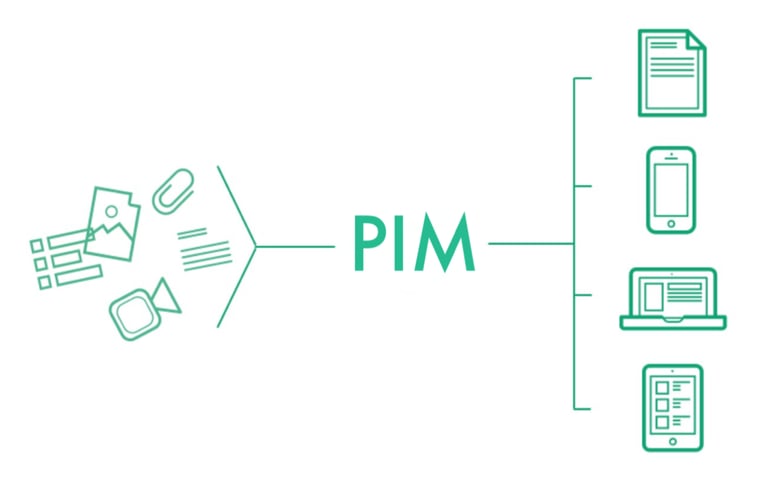
Table of Contents
The management of data can be a difficult process and is a common cause of snags in the world of ecommerce. In addition to storage problems, you may find duplication or errors across different systems, as well as issues with the location, sharing and checking of isolated data.
For any retailer, supplier or manufacturer that takes its internal organization and digital future seriously, a data management strategy with the right tools is indispensable.
What is data management?
Data management (DM) systems are diverse and powerful management tools. They can specialize in the storage, synchronization, analysis and distribution of the following data:
- Product information
- Customer databases
- Administrative and financial resources
- Multimedia files and other data
The key to these DM systems is automation. It saves time and costs, eliminates redundancies and errors in the databases, and sends the information to other channels, people or companies. This includes commercial partners, warehouse teams, sellers and distributors.
In other words, data management is a multiplatform process consisting of several tools with different objectives. Together these help achieve a centralized harmony of data in the day-to-day running of a company.
Features of Data Management Systems
Global-leading data management programs won’t just provide a centralized storage facility for you to hold your data, they will also integrate with your other software and include features for:
- Analyzing data
- Checking for omissions
- Monitoring the usage of each file
- Updating associated applications and platforms
Benefits
Handling the entirety of a company's digital data is a huge task, which makes data management technology an indispensable asset. These tools save time, streamline processes and optimize resource usage. Here are just a few of the advantages of DM tools:
- They can handle any volume. No matter how much your database grows, data management systems can easily manage unlimited quantities of data and fields.
- They facilitate global work. Any permitted user can access the data management tools from any device and location, and continue to work under any circumstance. This centralized functionality of data management programs is perfectly suited to the needs of working remotely and synchronizing international teams.
- They eliminate data redundancies and omissions. Such errors are difficult to detect manually, but automated data management techniques can boost your accuracy to close to 100%.
- They guarantee a high level of security, efficiency and privacy. This is essential if you are leaving all the company's information in the hands of a single tool. In addition, they include backup generation, a history of changes and options for recovery of past data.
- They save on storage. Thousands of Excel files, photos in different formats and Word docs with translations can become complicated and overwhelming for any team. A data management system can help save on space since it will include its own storage system (better still if it’s in the cloud) and also save on the cost of subscribing to accounts like Dropbox.
- They optimize data access. Your team will save a lot of time by having access to the data they need, and can rely on, at all times. Data can also be exported to any format you need to share with third parties or across other digital channels.
Disadvantages
At the same time, DMS tools that incorporate a lot of features are sometimes oriented to an enterprise-level business profile. This can bring with it a very high cost.
In addition, the process of implementing these tools in a company can sometimes be difficult, requiring specialized personnel and the training of employees and teams. With the introduction of any data management program, a period of familiarization, adaptation and testing is required, depending on the complexity of your company's data structure. You’ll also need to spend considerable time managing all the permits and access rights, and activating the new protocols for security and data management.
The good news is that there are a number of cloud data management tools that provide a smooth and seamless onboarding process. This is often provided alongside tech support to help reduce installation time.
Types of Data Management tools
With so many benefits in using effective data management tools, more and more systems are coming to market. These are the most popular data management tools for companies that are interested in digitizing:
Product Information Management (PIM)
This is the ultimate tool for manufacturers and retailers seeking a centralized hub for all of their product content.
Through automation, a PIM or product information management solution allows you to manage, enrich and synchronize your product information across all sales channels, catalog design programs, third party platforms and your supply chain.
Discover PIM today and speak with one of our PIM professionals to find out about our product management platform and how it can help your business.

Master Data Management (MDM)
These are tools that manage the central and master data of a company, at the levels of business, employees, customers, accounts, operations, regulations and so on.
MDM programs include:
- Data cleansing
- Centralization
- Keymapping
- Transaction Control
- Multi-Domain support
- Information distribution
- Global synchronization
Data Modeling
This is the process of adapting your data to the format needed for storage in the company's database. Data management tools in this category allow you to generate conceptual models and establish the rules for consistency and quality that your data requires.
Data Warehouse (DW)
These are programs dedicated to generating storage locations for your data. Usually linked to hardware already available within your company, they do not include management processes that are specialized according to data type. They are tools for storage, but by themselves, they provide neither a structure nor a smart analysis of information.
Other processes that may include their own tools are data quality analysis, metadata, data architecture, security and storage.
Data management tools can also centralize your data according to different criteria, such as a relational model, hierarchical (in tree format) or a network. Such criteria will influence the type of DM you need; for example, in product data management, relational databases are useful for linking mutually dependent information fields such as model, size, and color.
Conclusion
While the thought of a data management tool might seem intimidating at first glance, there are tools on the market that are adaptable to any given company profile. Scalable solutions exist to cater for the data needs of small, medium and large companies.
Having a centralized and automated database should be a fundamental goal of any business, whether it’s just starting to grow or is well-established. And the best thing is, you don’t need a large number of tools to achieve this. Depending on the needs of your business, you can access all the features you’re looking for from a single platform.
Sales Layer’s PIM is a global-leading product information management tool for retailers, suppliers and manufacturers. Our platform combines data centralization, external channel networking, and data quality analysis, providing unlimited cloud storage in addition.
Get started today with your own 30 day free trial and take control of your data.





.jpg)
-1.webp?width=520&name=formulas-excel-gestion-inventario%20(1)-1.webp)



